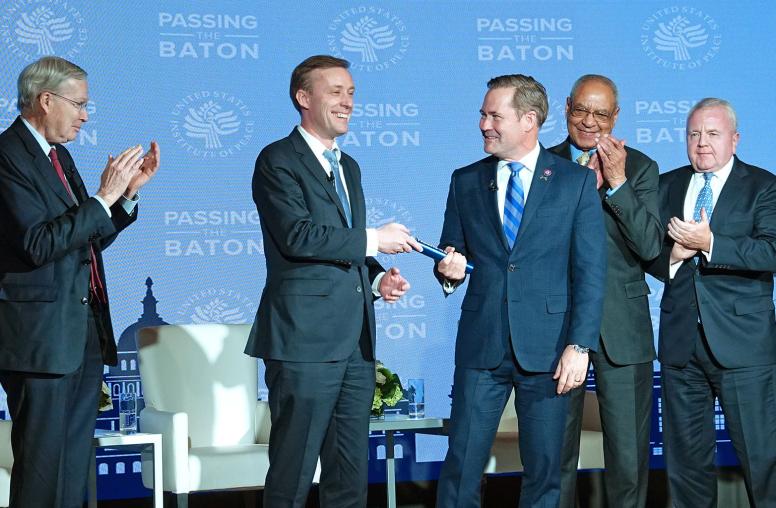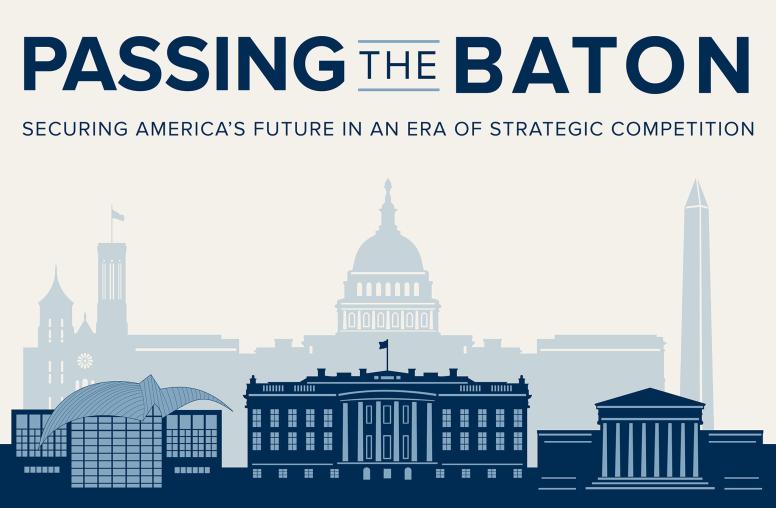Immediate Imperatives in Post-War Iraq
Institute Newsbyte explores public security, governance, humanitarian assistance, and WMD concerns in post-war Iraq.
WASHINGTON—With the Iraq war essentially over, United States priorities are quickly shifting to securing the peace and setting Iraq on the path to democracy. Concerns about immediate needs have been exacerbated by the inability of coalition forces to control widespread looting and lawlessness in Baghdad and elsewhere, reported shortages of potable water in some areas, and the failure to date of coalition forces to find weapons of mass destruction (WMD).
In launching an effort that will be much more ambitious than other democracy-building exercises of the past few decades, the United States and its coalition partners must meet several immediate imperatives before they can begin transforming Iraq into a state that can provide a better quality of life for its people and does not threaten its neighbors and others with WMD. These imperatives include providing basic public security and humanitarian assistance as dictated by international norms and finding and securing Iraq's WMD.
On April 16, 2003, the U.S. Institute of Peace held a Current Issues Briefing entitled "Post-War Iraq: The Immediate Imperatives," to shed light on what needs to happen right way to avoid further chaos, provide for humanitarian needs, and secure any WMD.
Daniel Serwer, the Institute's director of peace operations, moderated the discussion. Participants were:
- Robert Perito, special adviser to the Institute's Rule of Law Program;
- Ray Jennings, Institute senior fellow;
- Jonathan Tucker, Institute senior fellow; and
- George Ward, humanitarian affairs coordinator, Office of Reconstruction and Humanitarian Assistance, U.S. Department of Defense (via phone from Kuwait).
The views summarized below reflect the discussion at the meeting; they do not represent formal positions taken by the Institute, which does not advocate specific policies.
Public Security Must Be the Top Priority
As should have been anticipated, collapse of the Saddam Hussein regime precipitated looting in much of Iraq, though so far it is not clear whether anticipated revenge killings are taking place. Coalition forces need to reorient themselves quickly from war-fighting to peacekeeping, which requires different skills and training as well as equipment. While the initial spasm of violence appears to be subsiding, lawlessness will not fade on its own. The United States must take quick and decisive steps in order for lawlessness not to take hold in Iraq.
Saddam Hussein's security services personnel, collectively numbering in the tens of thousands, have left their posts but have not disappeared. There is some hope that the Iraqi National Police, which were not responsible for the worst human rights offenses of the Saddam Hussein regime, would be able to resume its regular functions, though it will take considerable time and effort to purge Ba'ath Party and criminal elements and to retrain those who remain. The same diligence must be shown towards Iraq's legal system. Having operated for so long under an ad hoc system of decrees, it will take international and Iraq legal experts time to review current Iraqi law and make sure it conforms to international human rights standards. Under the Geneva Convention, the United States and its coalition partners have a duty to provide law and order. They also must provide recommendations and experts to assist Iraqi jurists in crafting laws and procedures as Iraq evolves toward democracy.
A Coordinated Humanitarian Effort is Underway
The United Nations and non-governmental organizations (NGOs) will act as the primary distributors of humanitarian aid and relief. Military means are only being used as a stopgap measure until others can deploy and take on this task. The United Nations could be the central coordinator of this effort. NGOs, which make their own decisions on deployment, are now entering Iraq or are stationed in neighboring countries.
Although the humanitarian situation in Iraq is not disastrous, troubling gaps are appearing in the availability of clean water and electricity. Lack of fuel and water could lead to a major public health problem, if not resolved soon. Relief efforts are underway in the majority of southern Iraq, but northern Iraq, particularly the city of Kirkuk, is experiencing a serious public security gap that has forced the closure of some hospitals because staff are staying home in fear for their safety. Donor contributions to the relief effort are over-subscribed, and coordinators are making sure that aid is being properly matched with real need. Thus far, food supplies have been adequate.
Internally displaced persons (IDPs) are returning to their homes, including 300,000 people who have left IDP centers in northern Iraq. Other IDPs will want to return home as well in the near future. It is in this mass of returns that inter-ethnic violence and revenge killings could surface. At the moment, the public security gap is making it difficult to distinguish such violence from the general breakdown of law and order.
Transition Process to Democracy Will Be Slow and Difficult
Iraq's political transition to a democratic state will not occur by simply holding elections. The United States should expect to be engaged in supporting the institutions that allow for non-violent political expression and participation for five years or more. There are no shortcuts.
There are also serious impediments to success. Public expectations have been raised, but it will be difficult to fulfill them for some time to come. The United States had hoped for the reconstruction effort and transition to democracy to be mainly in Iraqi hands, but given the collapse of the state it may be necessary for the coalition to play a more direct role. In a chaotic public security environment, regional, ethnic, and religious identities may be used by political agitators to stir up inter-communal violence, even over basic issues such as the distribution of humanitarian aid.
Moderate reformers will emerge as leaders in the political process only if there is a stable security environment. Beyond that, the United States will have to ensure that it practices what it preaches, avoiding picking winners in the political process, maintaining transparency of oil revenues and expenditures, eschewing the caste system that characterized post-World War II interventions in Japan and Germany, and working hard to develop local governments as well as the national one. For the Iraqi people to see real quality-of-life improvements, both national and local infrastructure projects must be embarked upon with local input on how best to use the country's resources.
Finally, the United States needs to ensure the sustainability of its own effort, which will be expensive and lengthier than currently anticipated. Iraq may quickly fade from the headlines, but the support of the American people will be required if adequate resources over a period of years are to be found.
WMD Must Be Found
The United States invaded Iraq after reaching the conclusion that the UN inspections to disarm the regime of Saddam Hussein of its weapons of mass destruction were ineffective. Legitimacy for this war may therefore require finding Iraq's suspected chemical and biological stockpiles in significant quantities. The detection of such weapons will not be easy because the Iraqi security services became adept at hiding them from the UN inspectors. Without quality human intelligence from former members of the regime security services, buried weapons caches may never be discovered. At the moment, teams of U.S. military and civilian personnel are searching for the regime's chemical and biological stockpiles, but the inspectors have come under increased criticism for their methods and lack of independent verification. UN participation in the weapons hunt, or confirmation of reported weapons discoveries by neutral countries, would be useful in ensuring that evidence of prohibited weapons is viewed as credible by the international community.
The Iraqi scientists who helped create the weapons program must also be found. They represent a serious security risk, as their lethal knowledge could fall into the hands of other rogue states or terrorists. It will also be vital for the United States to create transition programs for these scientists and their families so they can be reintegrated into the mainstream scientific community or find appropriate work in the private sector. Establishing an internationally funded science and technology center in Baghdad that would provide nonmilitary employment and research grants, comparable to the one established for former Soviet weapons scientists after the Cold War in Moscow and Kiev, would help to solve this problem, as would amnesty for those who worked on Iraq's WMD programs.
Conclusions
The first twelve months of the post-war transition will be a make-or-break opportunity for the coalition and for a democratic Iraq. Failure to create a safe environment, provide basic services, or give the Iraqis a stake in their country's own development will create a fractured and lawless Iraq. If Saddam Hussein's stocks of chemical and biological weapons are not found and disposed of completely, and the scientists who made them not accounted for and offered peaceful employment, the proliferation of mass-destruction weapons this war was supposed to prevent could actually be accelerated. Specific suggestions the panel made include:
- Make a sustained political and financial commitment to the reconstruction effort in Iraq.
- Make the restoration of public security an immediate priority. Augment the current coalition force structure by rapidly introducing military police, recruiting constabulary forces from our coalition partners, and recalling the Iraqi police.
- Avoid polarization of Iraqi society around exclusive identities (Sunni/Shia, Kurd/Arab, Christian/Muslim), develop the notion of citizens with multiple identities living in a secular state, and encourage political activity by women.
- Allow UN weapons inspectors to resume work in Iraq, or alternatively, transfer suspected weapons material to the United Nations or to neutral countries for independent verification and analysis. Several members of the Security Council contend that UN inspectors will have to certify the disarmament of Iraq before economic sanctions can be lifted, opening the way for loans from bilateral donors, the World Bank, and the International Monetary Fund.
- Develop a comprehensive regional security strategy so a new Iraqi government will not feel the need to arm itself with WMD.
This Newsbyte was written by program assistant Matthew Crane. The views summarized above reflect the discussion at the meeting; they do not represent formal positions taken by the Institute, which does not advocate specific policies.



